Introduction
Pets can be vital companions in the challenging journey of addiction recovery and rehabilitation. Whether through the unconditional support they provide, or their more structured roles in therapy, animals have unique contributions to make in both human and pet-focused rehabilitation processes. This article will explore these multifaceted roles, examining not only the psychological benefits of pets in addiction recovery but also the intersection of animal care with substance use disorder treatment.
Bringing Pets to Rehab: Benefits and Challenges
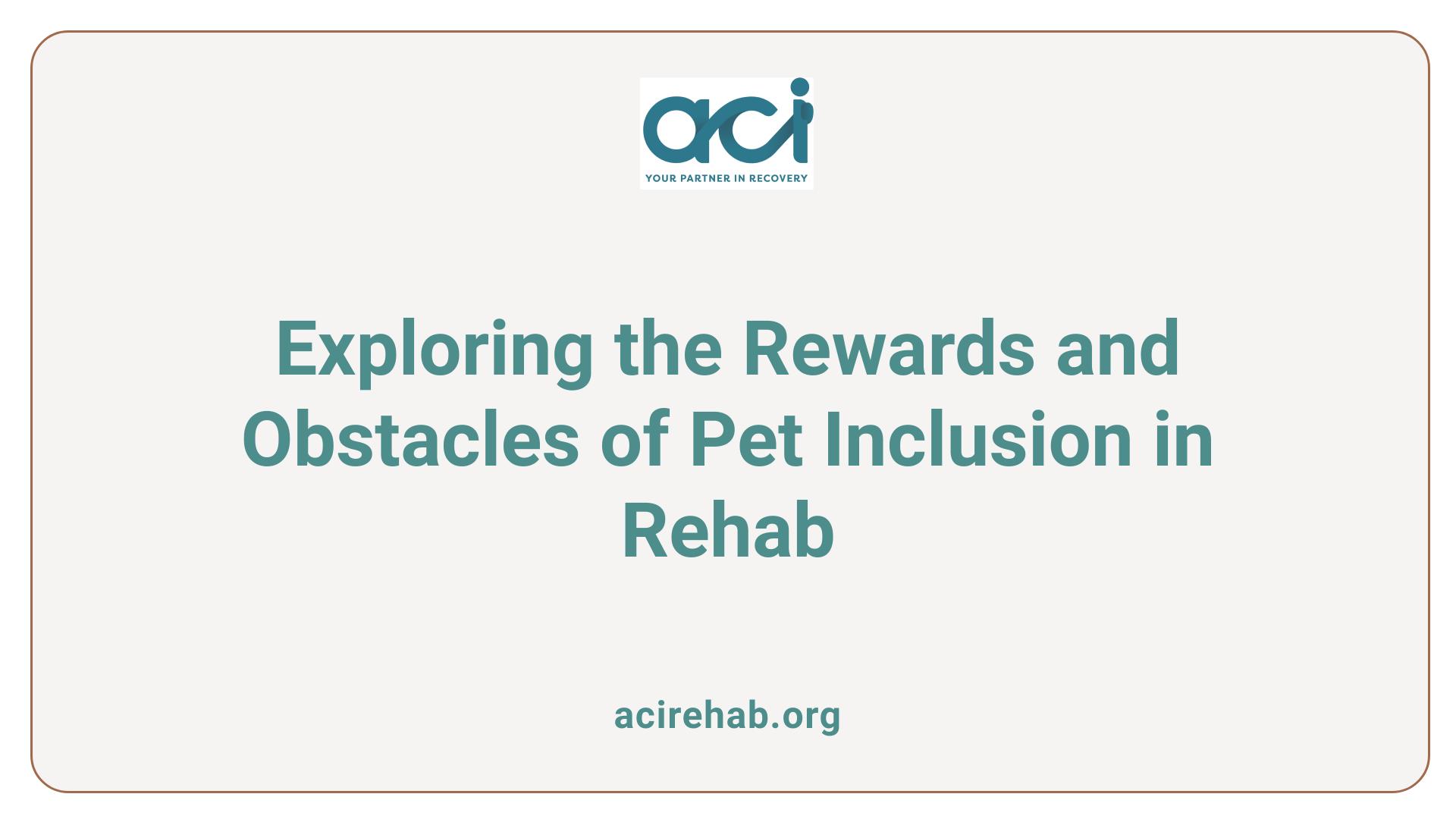
What are the benefits and challenges of bringing pets to drug rehabilitation facilities?
Bringing pets to drug rehabilitation facilities offers numerous benefits, primarily through emotional support and companionship. Having a pet can significantly help reduce stress and anxiety during such a challenging time. Interaction with animals has been shown to lower blood pressure and increase the release of oxytocin, vital for emotional regulation.
Moreover, pets can promote a consistent routine, encouraging individuals to engage in positive habits like daily exercise and responsibility. This accountability fosters personal growth and can motivate individuals in recovery to maintain their sobriety even after leaving rehab. The presence of animals also encourages socialization, helping to build connections with others and alleviating feelings of isolation.
However, challenges do exist when it comes to accommodating pets in rehab facilities. Not all centers allow animals, and those that do may have specific guidelines regarding pet size, breed, and health requirements. It’s also necessary to ensure the well-being of the pets, including their care and emotional needs.
Overall, while integrating pets into rehabilitation can enrich individuals’ experiences and provide essential emotional support, it necessitates careful consideration and adequate resources from facilities.
Psychological Benefits of Pets in Recovery
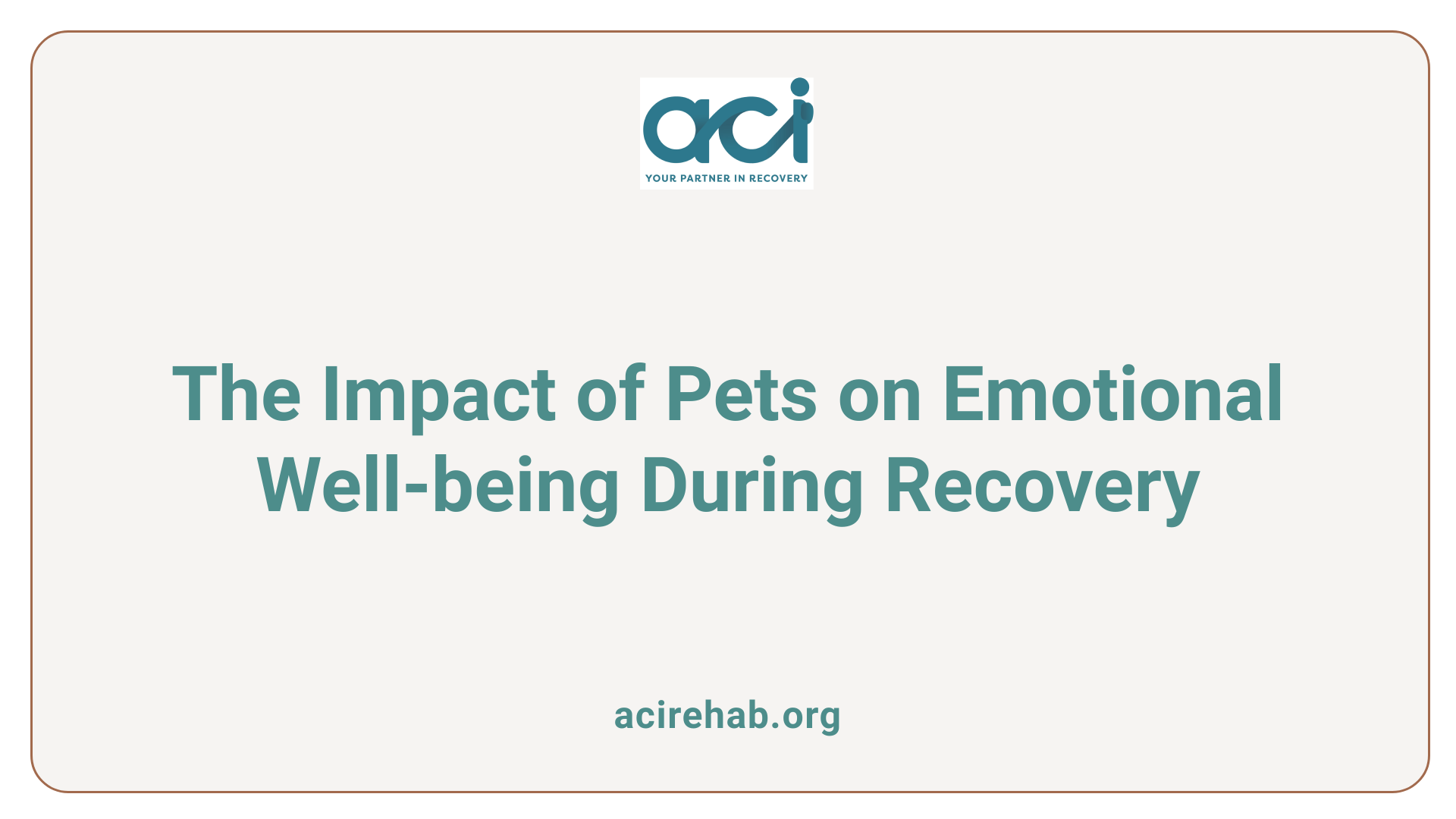
How do pets contribute to addiction recovery and what are their psychological benefits?
Pets play a crucial role in addiction recovery by offering emotional support and companionship. Their presence helps alleviate feelings of loneliness, which can often intensify during difficult treatment phases. For many individuals, pets are viewed as family, providing a sense of unconditional love and security that is vital during recovery.
Research indicates that interacting with animals can lead to significant reductions in stress and anxiety. Pets can lower cortisol levels and blood pressure, which are often elevated in those coping with addiction. The act of caring for a pet promotes responsibility and time management—skills essential for maintaining a healthy routine during recovery.
Moreover, pets encourage physical activity, which is not only beneficial for cardiovascular health but also enhances mood and emotional well-being. Engaging with animals can foster social interactions, as pet owners often connect with others who share the experience of caring for a pet. This social aspect helps combat isolation, creating a supportive environment conducive to healing.
In summary, the emotional support provided by pets can significantly improve recovery outcomes, enabling individuals to focus on positive experiences and stay committed to their journey.
| Benefit | Details | Impact on Recovery |
|---|---|---|
| Emotional Support | Provides companionship and reduces loneliness | Enhances motivation and focus |
| Stress Reduction | Lowers cortisol levels through interaction | Decreases anxiety and improves mental health |
| Encourages Physical Activity | Promotes regular exercise and movement | Improves physical health and cardiovascular fitness |
| Fosters Responsibility | Caring for pets encourages routine and structure | Increases accountability and self-worth |
| Facilitates Social Connections | Encourages interactions with other pet owners | Reduces isolation and builds support networks |
| Overall | Pets serve as a stabilizing force, helping to maintain a positive outlook | Critical for sustaining long-term recovery efforts |
Understanding Animal-Assisted Therapy
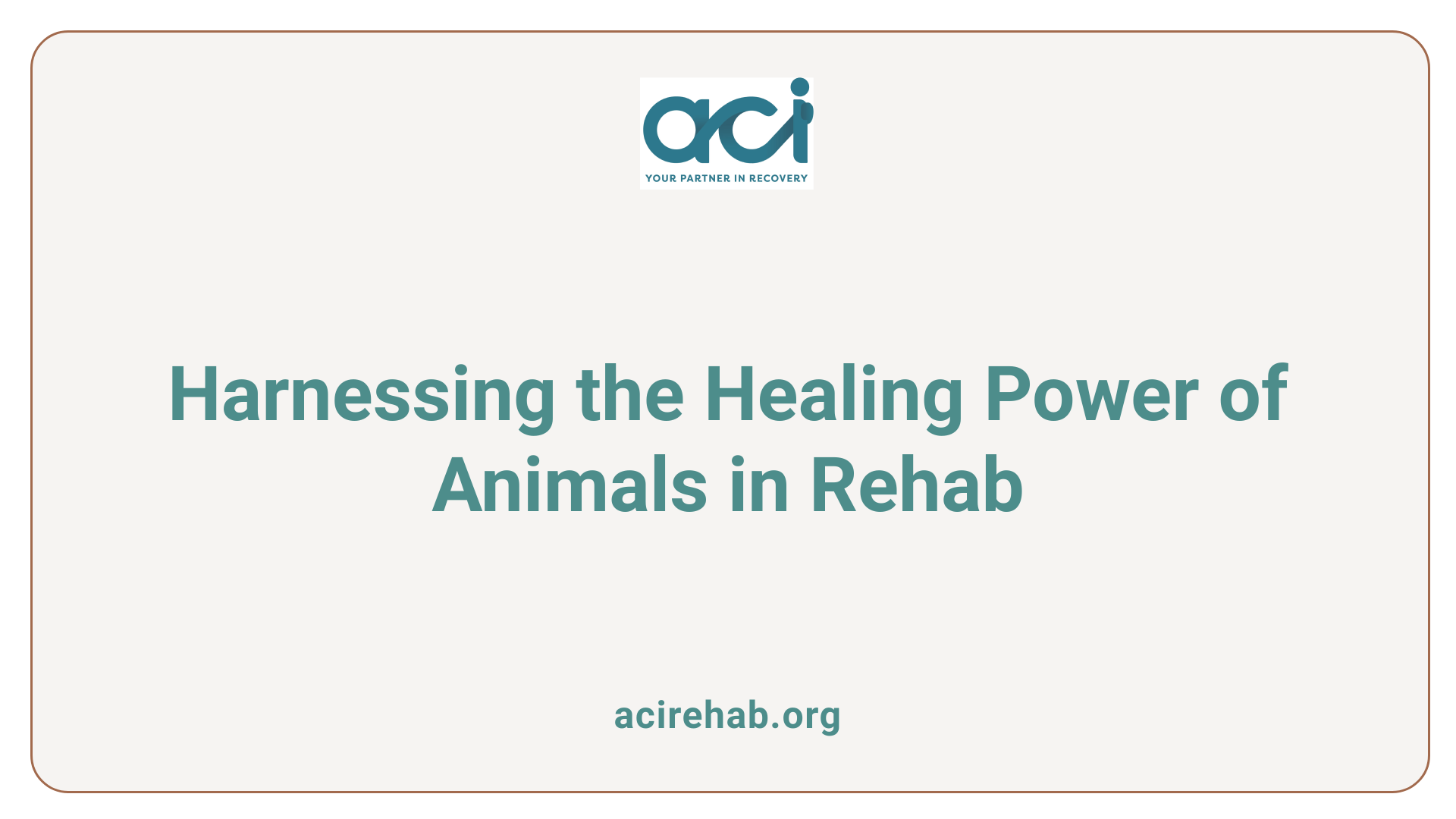
What is animal-assisted therapy and how is it applied in rehab settings?
Animal-assisted therapy (AAT) refers to therapeutic interventions that incorporate trained animals to assist individuals in coping with various emotional and psychological challenges, particularly within rehabilitation environments. In rehab settings, this approach focuses on aiding those recovering from substance abuse.
Through interactions with animals—commonly therapy dogs or even horses—patients often experience reduced aggression, anxiety, and depression. Animals provide unconditional companionship, which fosters emotional connections and encourages patients to communicate more openly. The presence of therapy animals can create a non-judgmental atmosphere that enhances emotional openness, thus improving overall participation in treatment programs.
Benefits of AAT in rehab settings
The therapeutic benefits of AAT extend beyond emotional support. Research indicates that these interactions can lead to significant improvements in mental health, including:
- Reduced stress levels: Interacting with animals can lower cortisol, the stress hormone, resulting in greater calmness and well-being.
- Improved cardiovascular health: Engaging with animals typically encourages patients to increase their physical activity, which can enhance cardiovascular metrics.
- Increased self-esteem and happiness: Regular interaction with therapy animals often boosts mood and fosters feelings of purpose, essential in recovery.
AAT serves as a complementary approach to traditional therapies, contributing to a well-rounded recovery experience. The structured interactions are designed to meet specific therapeutic goals, ultimately aiding in the journey toward sobriety and overall wellness.
Managing Pet Care During Treatment
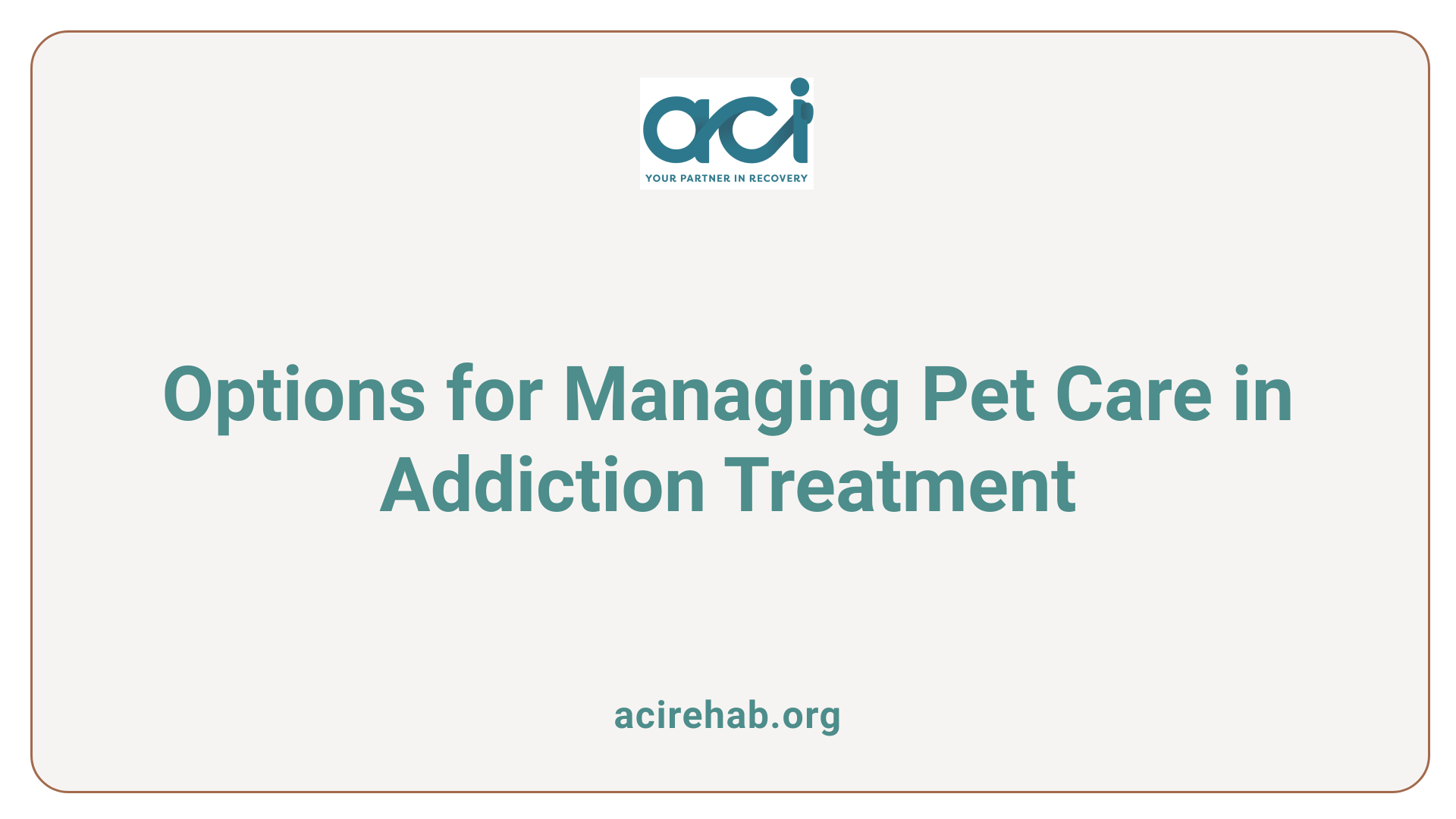
What options are available for managing pet care while undergoing addiction treatment?
When embarking on the journey of addiction treatment, individuals often face the critical task of managing pet care. This is vital not only for the pets’ wellbeing but also for the emotional health of the owners. Here are several practical options:
- Pet Sitters: Reliable professional pet sitters can provide care tailored to your pet’s needs, offering companionship and attention during your absence.
- Boarding Facilities: Many pet boarding options are available, with costs typically ranging from $30 to $50 per night for dogs. This ensures pets are cared for in a safe environment while their owners focus on recovery.
- Family and Friends: Trusted relatives or friends can step in to pet-sit, offering a familiar face for pets that can alleviate stress for both parties.
- Pet-Friendly Rehab Centers: Some rehab facilities allow pets to stay with their owners, which significantly eases anxieties associated with separation.
- Volunteering at Animal Shelters: For those unable to have their pets with them, volunteering can provide emotional support akin to pet ownership, promoting structure and purpose during treatment.
Importance of a Support System for Pet Care
A robust support system enhances pet care options during treatment. Emotional support through pets is invaluable, as it fosters accountability and motivation that are essential in recovery. Having a plan in place for pet care can mitigate stress, allowing individuals to fully engage in their treatment process without the worry of their pets being neglected. Communication with friends, family, and rehab facilities is key to ensuring a smooth transition for both pets and their owners.
Rehabilitation Services for Pets
How do rehabilitation services for pets work, and what qualifications do practitioners need?
Rehabilitation services for pets are designed to assist animals in recovering from injuries, enhancing mobility, and managing chronic pain, paralleling human physical therapy. These services often include a variety of treatments such as aquatic therapy, strength training, and massage, ensuring a holistic approach to healing.
Practitioners in this field are typically veterinary physiotherapists and certified rehabilitation therapists. They often pursue specialized certifications like the Certified Canine Rehabilitation Therapist (CCRT). Achieving this certification involves completing several modules covering clinical skills and participating in a 40-hour internship.
Training programs for veterinary professionals and physical therapy students provide foundational knowledge critical for effective rehabilitation. Organizations like the Academy of Animal Sport Science and Healing Oasis Wellness Center offer advanced certifications, promoting a diverse range of qualifications.
Overview of rehabilitation services for pets and their practitioners’ qualifications
| Service | Focus Area | Practitioner Qualifications |
|---|---|---|
| Physical Therapy | Injury recovery and pain management | Certified Canine Rehabilitation Therapist (CCRT) |
| Aquatic Therapy | Mobility improvement | Veterinary physiotherapy and advanced training |
| Massage Therapy | Stress relief and recovery support | Specialized certifications in animal massage |
| Strength Training | Muscle rebuilding | Ongoing education and validation of skills |
| Range of Motion Exercises | Enhancing flexibility | Certification in animal rehab or therapy |
| Alternative Therapies | Stress reduction | Various certifications in complementary veterinary practices |
Continuous education opportunities, such as RACE-approved courses, play an essential role in supporting practitioners in keeping their credentials up-to-date in this rapidly evolving field.
Policies on Pets in Rehab and AAT
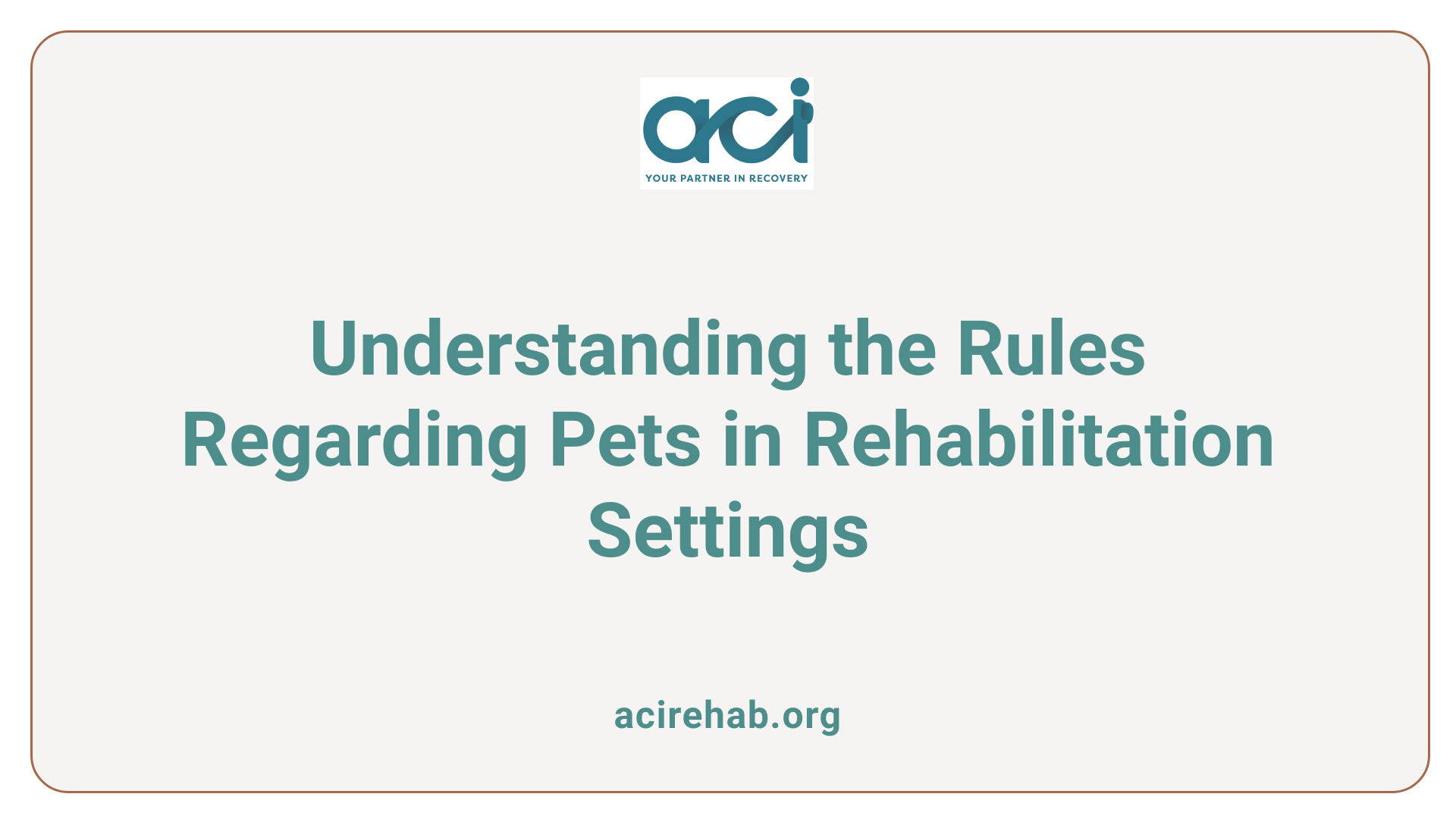
What are the policies regarding pets in rehabilitation centers and animal-assisted therapy?
Policies surrounding pets in rehabilitation centers vary significantly, often tailored to the specific therapeutic goals of each facility. Some rehab centers allow pets, predominantly dogs and cats, while others maintain a strict policy against any animals on the premises to preserve a focused treatment environment.
For those centers that permit pets, each case is evaluated individually. Requirements may include:
- Up-to-date vaccinations
- Health records
- Proof of good behavior
- Owner responsibility for care
Additional restrictions can also apply regarding the type and size of pets allowed. Some facilities might charge fees for accommodating animals.
Role of AAT in rehabilitation
Animal-Assisted Therapy (AAT) serves as a complementary approach in many rehab contexts, enriching traditional therapeutic modalities. It leverages the bond between humans and animals to:
- Reduce stress levels
- Enhance emotional regulation
- Improve social interactions
Through structured sessions with animals such as therapy dogs and horses, AAT can support improved mental health outcomes, including increased self-esteem and happiness. With evidence showing AAT also benefits physical health—lowering blood pressure and encouraging mobility—this method is increasingly recognized as a valuable asset within rehab programs.
Programs Supporting Pets and Owners in Rehab
Organizations Supporting Pets
Numerous organizations focus on aiding individuals in rehab who have pets. For instance, Dogs Matter provides foster care for pets of those undergoing rehabilitation, emphasizing the emotional bond between pets and their owners. With over 1,200 dogs helped, their mission illustrates the importance of keeping pets and owners connected. Similarly, PAWsitive Recovery supports people battling addiction by fostering animals, preventing the distress of giving up pets during treatment.
Emotional Benefits of Having Pets
The presence of pets in rehabilitation settings can have profound emotional benefits. Pets offer unconditional love and companionship, which can significantly reduce feelings of loneliness and anxiety during recovery. Programs incorporating Animal-Assisted Therapy (AAT) focus on fostering emotional, cognitive, and social improvements through structured interactions with animals. These connections not only support emotional well-being but also help reinforce routines, promoting accountability and stability for individuals working toward sobriety.
Practical Support in Recovery
Beyond emotional relief, having access to pets can provide practical benefits. The responsibility of caring for a pet encourages routine and physical activity, both vital for maintaining sobriety. Such structured engagement helps individuals develop healthy habits while reinforcing their sense of self-worth. Therefore, organizations that facilitate pet care during rehab play a critical role in enhancing recovery experiences.
Conclusion
Recognizing the valuable role of pets in both human and pet rehabilitation highlights the intricate bond between animals and their owners. From providing emotional support in recovery settings to requiring specialized rehabilitation themselves, pets are integral to a holistic approach to care. As policies evolve and more programs emerge to support this unique connection, both humans and their pets can look forward to benefiting from comprehensive rehabilitation that respects and nurtures their mutual healing journey.
References
- Can You Bring Your Pet to Drug Rehab With You?
- Pet-Friendly Drug & Alcohol Rehab Facilities
- Pet Rehab
- How Pets Can Assist in Recovery | American Addiction Centers
- When dog owners go to rehab, he’s making sure their pets are cared …
- When Rehab Means Leaving Your Pets Behind – Evoke Wellness Ohio
- Finding Pet Care During Drug and Alcohol Rehab
- Navigating Pet Care During Your Rehab Journey | Cornerstone
- Rehabs That Allow Pets Near Me – Virtue Recovery Center

